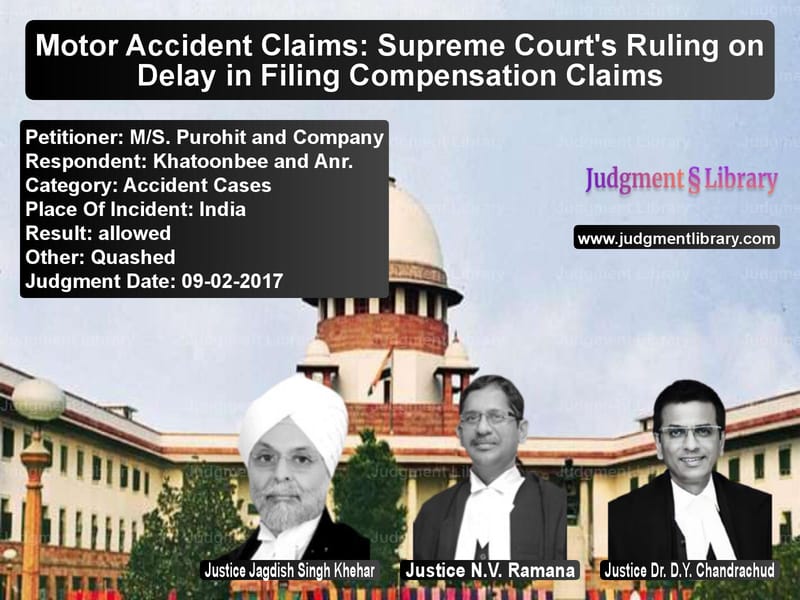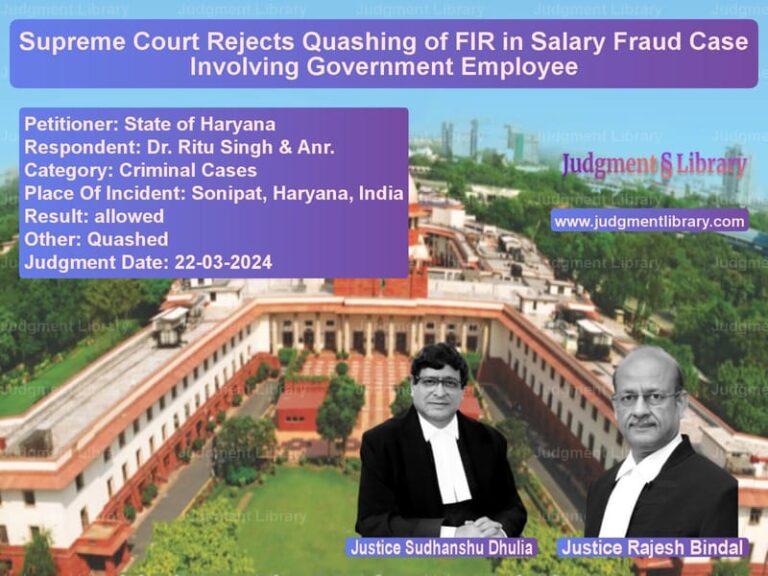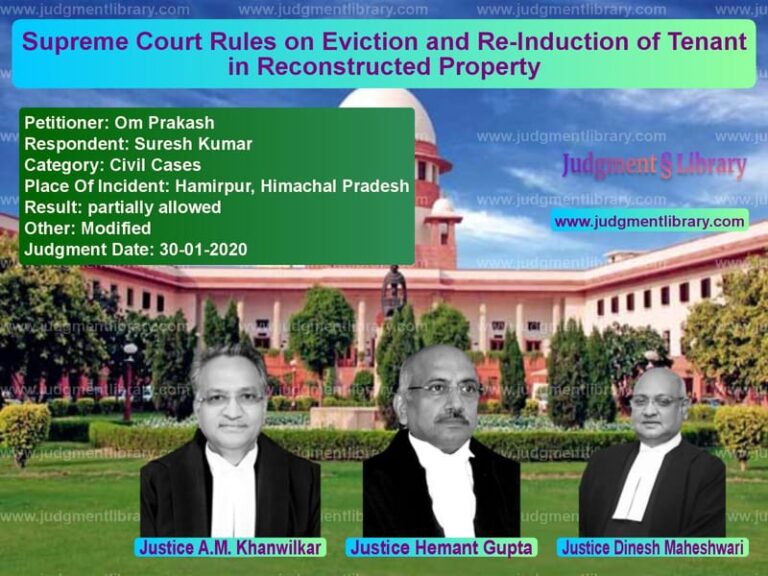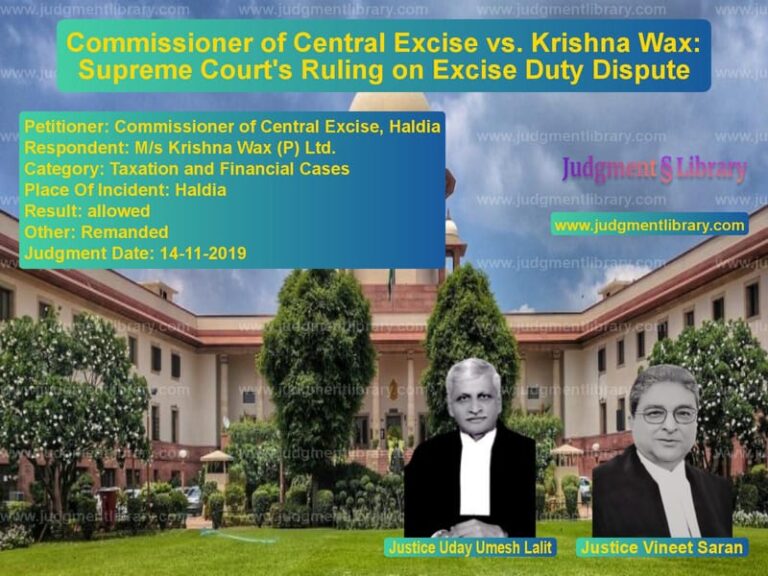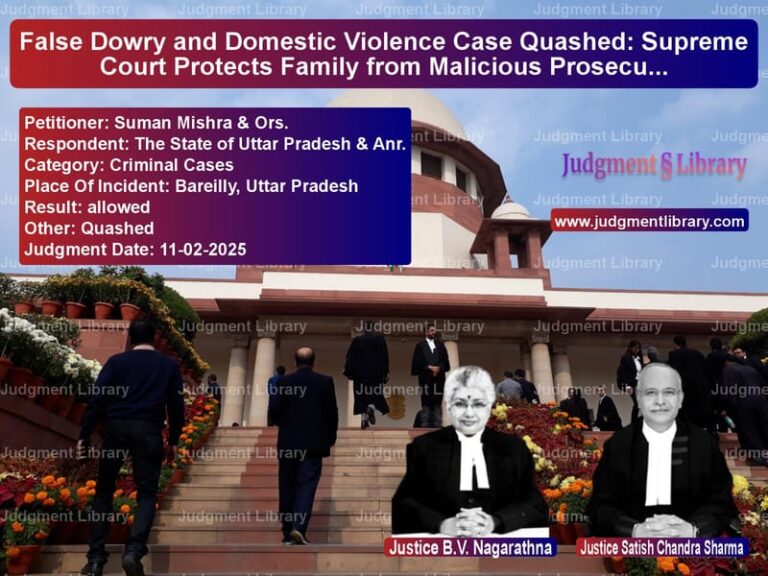Motor Accident Claims: Supreme Court’s Ruling on Delay in Filing Compensation Claims
Introduction
The Supreme Court of India in M/S. Purohit and Company v. Khatoonbee and Anr. addressed a significant question regarding the limitation period for filing claims under the Motor Vehicles Act, 1988. The case revolved around a claim petition filed after a delay of 28 years from the date of the accident, raising concerns over the survivability of claims in the absence of a statutory limitation period.
Background of the Case
The case arose from a motor accident that occurred on February 2, 1977, resulting in the death of the respondents’ daughter. The claim petition under Section 166 of the Motor Vehicles Act, 1988 was filed on February 23, 2005, more than 28 years after the accident. The Motor Accident Claims Tribunal entertained the claim despite its extraordinary delay, prompting the appellant, M/S. Purohit and Company, to challenge the maintainability of the petition on the grounds of delay.
Legal Issues Raised
- Whether the absence of a statutory limitation period for filing claims under the Motor Vehicles Act, 1988, allows claimants to file petitions indefinitely.
- Whether an inordinate delay of 28 years renders a claim stale and non-survivable.
- Whether the Tribunal and the High Court erred in entertaining the claim petition despite the prolonged delay.
Arguments by the Appellant
The appellant, M/S. Purohit and Company, contended that:
- Although Section 166(3) of the Motor Vehicles Act, 1988, which initially prescribed a limitation period, was omitted in 1994, claims must still be filed within a reasonable time.
- Allowing claims to be filed indefinitely would result in stale claims being entertained, leading to evidentiary difficulties.
- The claim petition filed after 28 years was not a live and surviving claim and should have been dismissed as time-barred.
Arguments by the Respondents
The respondents argued that:
- The deletion of Section 166(3) in 1994 removed the statutory limitation period, allowing claim petitions to be filed at any time.
- In Dhannalal v. D.P. Vijayvargiya (1996) and New India Assurance Co. Ltd. v. C. Padma (2003), the Supreme Court had held that claims should not be dismissed on limitation grounds.
- The respondents were poor and unaware of their legal rights, which justified the delay in filing the claim.
Supreme Court’s Analysis
The Supreme Court considered the legal position in cases where no statutory limitation period exists and examined relevant precedents. The Court acknowledged that:
- While there is no statutory limitation period under the Motor Vehicles Act, 1988, claims must still be filed within a reasonable time.
- The concept of stale claims applies even in the absence of an explicit limitation period.
- In cases under the Consumer Protection Act and Industrial Disputes Act, the Supreme Court has consistently held that claims should be filed within a reasonable period to remain legally enforceable.
Key Observations of the Court
- The claim in question was filed 28 years after the accident, making it a stale and non-surviving claim.
- The respondents failed to provide a reasonable justification for the prolonged delay.
- The deletion of Section 166(3) in 1994 did not grant claimants an indefinite right to file claims.
- The fundamental principle that legal claims should be pursued diligently applies even in the absence of a statutory limitation period.
Supreme Court’s Ruling
The Supreme Court allowed the appeal and set aside the High Court’s order. The Court held that the claim raised by the respondents was not a live and surviving claim due to the extraordinary delay of 28 years. The judgment emphasized that:
- While the removal of the limitation period under Section 166(3) of the Motor Vehicles Act allows flexibility, claims must still be filed within a reasonable time.
- Permitting stale claims would undermine the principles of fairness and legal certainty.
- The justification provided by the respondents (lack of awareness) was insufficient to condone the delay.
Conclusion
The judgment in Purohit and Company v. Khatoonbee clarifies the legal position on delayed claims under the Motor Vehicles Act, 1988. While the deletion of Section 166(3) removed the statutory limitation period, claimants are still expected to file petitions within a reasonable time. This decision ensures that claims remain fair, viable, and legally tenable while preventing abuse of the legal process through indefinite delays.
Don’t miss out on the full details! Download the complete judgment in PDF format below and gain valuable insights instantly!
Download Judgment: MS. Purohit and Com vs Khatoonbee and Anr. Supreme Court of India Judgment Dated 09-02-2017.pdf
Direct Downlaod Judgment: Direct downlaod this Judgment
See all petitions in Compensation Disputes
See all petitions in Motor Vehicle Act
See all petitions in Negligence Claims
See all petitions in Judgment by Jagdish Singh Khehar
See all petitions in Judgment by N.V. Ramana
See all petitions in Judgment by Dhananjaya Y Chandrachud
See all petitions in allowed
See all petitions in Quashed
See all petitions in supreme court of India judgments February 2017
See all petitions in 2017 judgments
See all posts in Accident Cases Category
See all allowed petitions in Accident Cases Category
See all Dismissed petitions in Accident Cases Category
See all partially allowed petitions in Accident Cases Category

